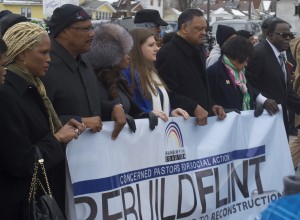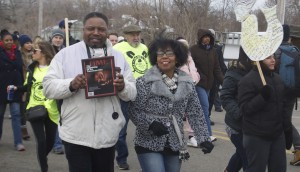By Nic Custer
In the shadow of the former Buick City industrial complex and passing by pipes waiting to be installed in the Karegnondi pipeline, hundreds of diverse local and out of town activists marched a mile from the Metropolitan Baptist Church to the Flint Water Treatment Plant Feb. 19.
Their aim, declared on signs and in speeches, was to demand new infrastructure and protest policies and politicians responsible for the city’s ongoing drinking water crisis.

Judge Greg Mathis, Phaedra Parks, Melissa Mays, Jesse Jackson lead the Feb. 19 march.
Longtime civil rights activist Rev. Jesse Jackson, Judge Greg Mathis, water activist Melissa Mays, and attorney Phaedra Parks led the march, which ended with a series of short speeches in front of the water plant off Dort Highway.
The Rebuild Flint March and Rally, organized by Water You Fighting For and Communities in Crisis, began at the packed church, which is across the street from the former Buick City industrial site.
After brief statements, the energized crowd left the church to march down East Myrtle and Stewart avenues past rows of pipes waiting to be installed in the Karegnondi Pipeline.
The racially diverse group carried printed and handmade signs ranging from “Flint Lives Matter” and “Dirty water kills, 10 dead” to calls for new infrastructure or Governor Rick Snyder’s arrest.

“Gov. Snyder” strolls past Buick City
As other protesters chanted, “No justice, no peace” behind her, Lakisha Bah Stewart said she joined the march because she was trying to fight for clean water. She brought her mother Joyce Bah and her 3-year-old daughter Za’lia Stewart, who carried a sign reading “Water is a Human Right.” Lakisha said she believed everyone should be entitled to safe water and was upset that her family had been consuming and bathing in contaminated water.
“Our voice should be heard. Once it is heard it will make a difference,” she said.
Pastor Joseph Jenkins, of New Heaven Missionary Baptist Church, said he hoped the march would bring commitment from Snyder’s administration. He said he was optimistic Flint’s infrastructure problems would be fixed and said the crisis has created nationwide unity with Flint and caused other cities to scrutinize their own infrastructure more closely.

Willie Miller and Connie McNeal
Connie McNeal said she believes Snyder will act more quickly now that celebrities and national media are bringing awareness to the situation in Flint.
McNeal, who moved from Cleveland in 1995, said Flint residents don’t expect to see anyone caring about their problems. She was glad to see celebrities donating their time to bring attention to the issue. Although she said she wants to move back to Cleveland where most of her family still lives, she loves Flint and has friends and her church community in the city.
“When Flint suffers, I suffer because I am part of Flint now. This is my home,” McNeal said.
Willie Miller, a retired Flint firefighter, pointed to the closed fire station across the street from the march where he said he used to work. He said he is still in the city because he stayed too long and now can’t easily sell his house. He said he might just cut his losses.
“It should be better. We really don’t have a good shot at attracting jobs. It pretty much wiped Flint off the map,” he said.
As the hundreds of protesters marched over the Stewart Avenue bridge, both McNeal and Miller commented they see a brighter future for Flint when its current crisis is resolved. McNeal predicted the city will transition its economy to a college town with medical and service jobs like Cleveland did.

Trish Crane
Marcher Karen Connor said she hopes the march can lead to infrastructure replacement and Snyder being arrested for murder. She said efforts to coat the pipes with a protective layer to prevent further corrosion are just a quick fix. She said she wants the entire drinking water infrastructure to be replaced and residents to be employed to do the work.
“The reason the crime rate is so high is because of a lack of jobs,” Connor said. “If you want to cut down crime, get these young men working.”

Tayo Edwards and Justin Archer
Tayo Edwards came from Grand Rapids to join the march. She said the situation was infuriating and she couldn’t begin to imagine how residents must feel. Edwards, who also participated in the People’s Climate March in New York City in 2014, said she hoped government officials would start listening to the needs of residents and offer solutions.


You must be logged in to post a comment.